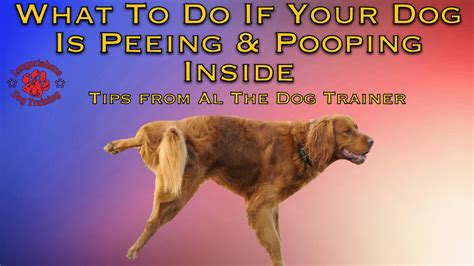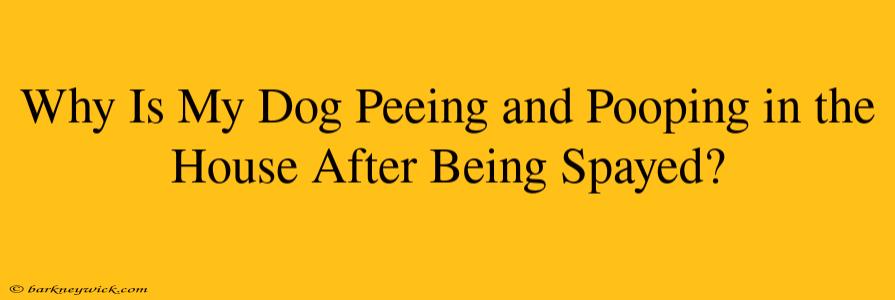Discover why your dog might be having accidents after spaying. Learn about medical and behavioral causes, and get expert tips to solve this common issue.
As I sat on my living room floor, scrubbing yet another urine stain from the carpet, I couldn't help but feel a mix of frustration and concern. My beloved Golden Retriever, Daisy, had been perfectly house-trained for years. But ever since her spay surgery two weeks ago, it seemed like all bets were off. The constant cleaning was exhausting, but more than that, I worried about what might be causing this sudden change in her behavior.
A Puzzling Post-Spay Problem
The day I brought Daisy home from her spay surgery, I expected some changes. Maybe she'd be a bit more lethargic or need extra cuddles. What I didn't anticipate was the complete regression in her potty training. It started with a few small accidents here and there, which I initially chalked up to the stress of surgery. But as the days went by, the problem only seemed to worsen.
One particularly memorable incident occurred during a visit from my in-laws. We were all gathered in the dining room, enjoying a lovely meal, when Daisy casually strolled in and squatted right there on the hardwood floor. The look of sheer mortification on my face must have been priceless. As I hurriedly ushered Daisy outside and grabbed the cleaning supplies, I knew it was time to get to the bottom of this issue.
Understanding the Post-Spay Predicament
In my experience as a dog owner and writer, I've come to realize that sudden changes in a dog's behavior often have underlying causes that aren't immediately apparent. While it's easy to feel frustrated or even embarrassed by your dog's indoor accidents, it's crucial to approach the situation with patience and empathy.
I believe that Daisy's house soiling wasn't a result of her forgetting her training or acting out. Instead, I suspected that the spay surgery had triggered some changes in her body that were affecting her ability to control her bladder and bowels. This realization prompted me to dive deeper into the potential causes and solutions for post-spay house soiling.

Medical Causes of Post-Spay House Soiling
Urinary Incontinence (USMI)
One of the most common medical reasons for increased urination after spaying is Urethral Sphincter Mechanism Incompetence (USMI), often referred to as spay incontinence. According to a study published in the Journal of the American Veterinary Medical Association, USMI affects approximately 20% of spayed female dogs.
USMI occurs when the muscles responsible for controlling urine flow weaken, leading to involuntary leakage. This condition is primarily caused by the hormonal changes that occur after spaying. The removal of the ovaries results in a significant decrease in estrogen levels, which plays a crucial role in maintaining the strength of the urethral sphincter.
Urinary Tract Infections (UTIs)
Another potential cause of indoor accidents after spaying is a Urinary Tract Infection (UTI). The American Kennel Club reports that UTIs affect up to 14% of dogs in their lifetime. Post-surgery factors that can contribute to UTIs include:
- Concentrated urine due to pain-induced urine retention
- Relaxation of the urethra during anesthesia, making it easier for bacteria to ascend
Symptoms of UTIs include frequent urination, straining to urinate, blood in the urine, and increased thirst.
Post-Surgical Pain and Grogginess
It's important to remember that spaying is a major surgery. The discomfort and grogginess experienced during recovery can lead to accidents simply because your dog may struggle to reach their usual elimination spot in time.
Behavioral Causes of Post-Spay House Soiling
While medical issues are often the primary culprit, behavioral factors can also contribute to house soiling after spaying:
Stress and Anxiety
The experience of surgery and recovery can be stressful for dogs. This stress can manifest in various ways, including changes in elimination habits. A study in the Journal of Veterinary Behavior found that stress can significantly impact a dog's house-training success.
Learned Habits
If a dog begins to eliminate indoors during the immediate post-spay period and this behavior isn't promptly addressed, it can become a learned habit. This is why it's crucial to manage the issue as soon as it arises.
Practical Steps to Address Post-Spay House Soiling
-
Consult Your Veterinarian: The first and most crucial step is to have your dog examined by a veterinarian. They can rule out or diagnose medical issues like USMI or UTIs and provide appropriate treatment.
-
Maintain a Consistent Routine: Stick to a regular schedule for feeding, walking, and bathroom breaks. This can help your dog regain control over their elimination habits.
-
Increase Bathroom Breaks: In the weeks following surgery, take your dog out more frequently than usual. This can help prevent accidents and reinforce outdoor elimination.
-
Use Positive Reinforcement: Lavishly praise and reward your dog for eliminating outdoors. This can help re-establish the desired behavior.
-
Clean Accidents Thoroughly: Use enzymatic cleaners specifically designed for pet accidents. These break down the odor-causing molecules, reducing the likelihood of your dog being drawn back to the same spot.
-
Consider Temporary Confinement: Using a crate or confining your dog to a small area when unsupervised can prevent accidents and aid in retraining.
-
Be Patient: Remember that recovery and retraining take time. Consistency and patience are key to success.
The Role of the American College of Veterinary Surgeons
When it comes to understanding and addressing post-spay complications like house soiling, the American College of Veterinary Surgeons (ACVS) plays a crucial role. The ACVS is the certifying organization for veterinary surgeons in the United States and sets the standard for advanced surgical care in animals.
ACVS board-certified surgeons are at the forefront of research into the long-term effects of spaying, including urinary incontinence and other post-surgical complications. They work to develop and refine surgical techniques that minimize these risks and provide advanced care for dogs experiencing post-spay issues.
If your dog's house soiling persists despite initial interventions, your primary veterinarian may refer you to an ACVS board-certified surgeon for specialized care. These experts can provide advanced diagnostic services and treatments, including minimally invasive procedures to address urinary incontinence.
Conclusion: A Return to Normalcy
After several weeks of increased vigilance, veterinary care, and consistent retraining, I'm happy to report that Daisy's indoor accidents have become a thing of the past. It turned out that she had developed a mild case of USMI, which we managed with medication and lifestyle adjustments.
The experience taught me valuable lessons about patience, the importance of prompt veterinary care, and the complex ways in which our dogs' bodies can be affected by surgery. It also deepened my bond with Daisy, as we worked together to overcome this challenge.
If you find yourself in a similar situation with your recently spayed dog, remember that you're not alone. With proper medical care, consistent training, and a good dose of patience, your furry friend can return to their house-trained ways. The journey may be challenging at times, but the reward of a happy, healthy, and accident-free dog is well worth the effort.
